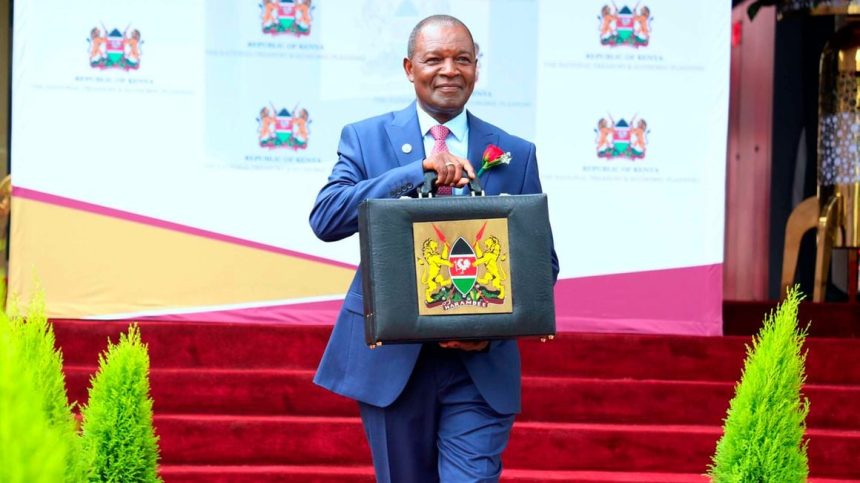The High Court on Wednesday extended orders freezing the implementation of the contentious Finance Act, 2023 as confusion lingers on the fate of the taxes unlawfully collected by the government since Saturday after the initial suspension.
Lawyers appearing for the State in the case argued the order bars the government from collecting a total of Sh578 million on a daily basis (Sh211 billion across the year), and that a majority of the taxes are consumption taxes, which cannot be collected afterwards.
The decision has, however, extended confusion for businessmen and tax agents who are expected to collect the elevated taxes from consumers and workers.
The State sought to have the suspension of the new taxes lifted, saying the restriction threatens to bring the operations of the government to a halt.
Justice Mugure Thande will rule on the application by Attorney-General Justin Muturi, seeking the lifting of the order on July 10.
Mr Muturi, through lawyer Githu Muigai, solicitor-general Shadrack Mose and senior counsel Kiragu Kimani, submitted that the suspension of the Finance Act, 2023 would compromise other government spending plans.
Prof Muigai submitted that the freeze affects, among others, the Appropriation Act, which allows money to be spent by the government including from the Consolidated Fund.

According to Prof Muigai, the freeze will suspend the allocation of revenue to the counties, payment of debts including international and domestic, and the salaries and wages of judges, among other state officers.
“These sideshows by the petitioners are masking the real nature of the constitutional, political, and financial crisis the country is facing, if the Act remains suspended,” he said.
The application was, however, opposed by the petitioners Okiya Omtatah, Eliud Matindi, Michael Otieno and four others, arguing that the government will not suffer any prejudice if the order remains in force.
They argued that Kenyans will have been taxed unlawfully if the petitions are successful.
“The interim orders are hereby extended to July 10,” the judge said.
At the same time, Mr Omtatah wants the court to punish the Energy and Petroleum Regulatory Authority (Epra) managing director, Daniel Kiptoo, after the agency adjusted fuel prices despite being served with the court order suspending the Finance Act.
Last Friday, Epra announced record fuel prices to reflect the doubling of the value-added tax (VAT) charged on petroleum products to 16 percent.
Mr Omtatah, the Busia senator, said he served the court order on Mr Kiptoo physically and electronically but the agency failed to restore the pump prices as they were before the Act came into force.
“If the court orders in issue herein are not obeyed, both the petitioners’ application and the main motion pending before this court will be rendered nugatory,” Mr Omtatah said in the application.
The State’s application was supported by Senate and National Assembly Speakers Amason Kingi and Moses Wetang’ula, who argued that the court order issued on June 30 was against the public interest.
Through lawyer Issa Mansur, Mr Kingi said if the order remains in force, the taxes are not likely to be recovered and this will occasion a lacuna in the operations or governance structure which if left unfilled, is likely to cause very grave consequences to the citizens.
He submitted that the order bars the government from collecting a total of Sh578 million on a daily basis (Sh211 billion across the year) and that a majority of the taxes are consumption taxes, which cannot be collected afterwards.
Senior counsel Otiende Amollo for Mr Otieno disagreed with the submissions and stated that the entire Act suffers from procedural impropriety.
Mr Amollo, who is also the Rarieda MP, argued that 22 new clauses were introduced on the floor of Parliament without public participation.
The lawyer said the clauses were introduced through addendum, yet public participation, a key requirement in taxation, was not factored in.
“A quarter of new provisions, which is to say 22 out of 84 clauses is essentially to bring a new Bill that the public did not participate. Taxation measures require openness, public participation and accountability,” he said.
The Act, the lawyer said, puts the housing levy under the administration and control of the Treasury Cabinet Secretary, making it unconstitutional as it amounts to an amendment of the supreme law.
“The Act infringes on fundamental rights. The housing levy, which compels the employer and employee to pay 1.5 percent each, does not accrue benefits to them at all. This amounts to servitude contrary to Article 30 of the constitution,” Mr Amolo said.
The lawyer agreed with Mr Omtatah that the Finance Act covers areas that go beyond the purview of taxes and duties and should have, therefore, been sent to the Senate for the concurrence of the two Speakers.



